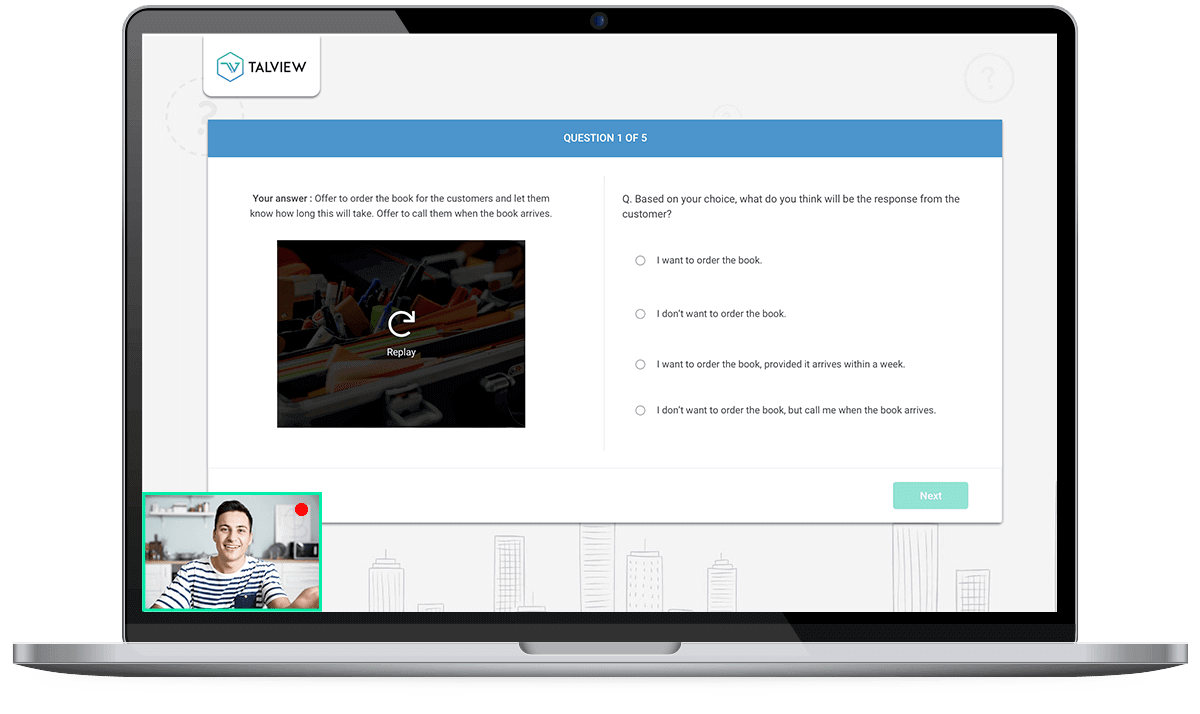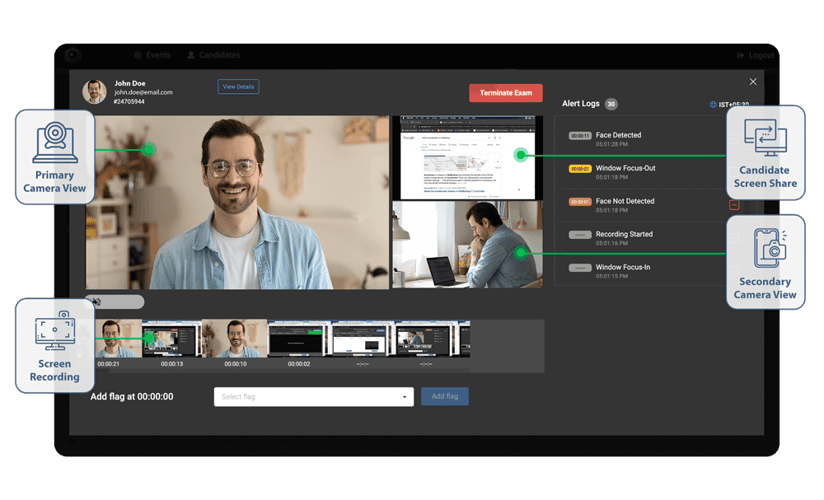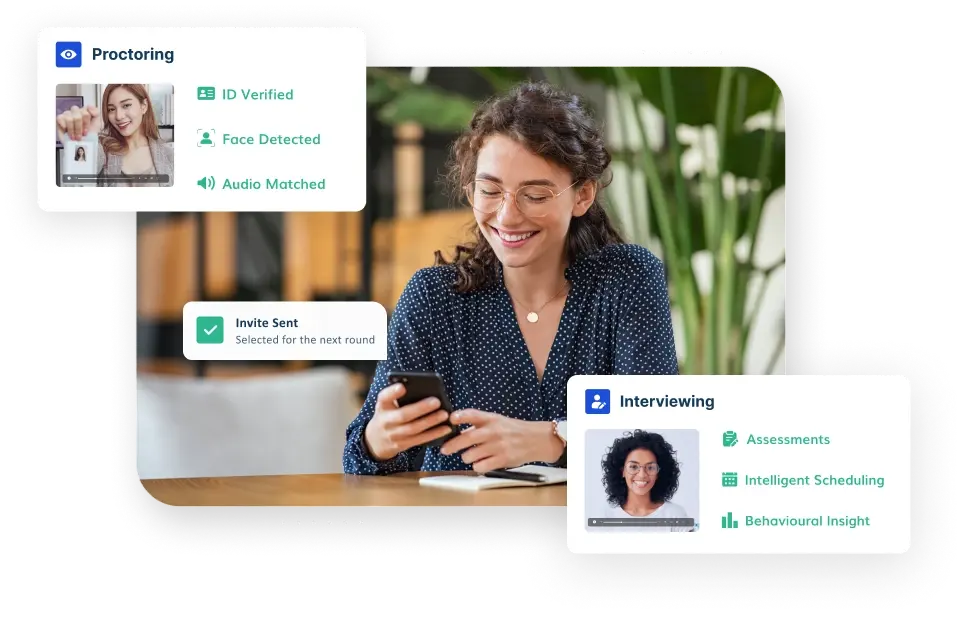What is an Online Proctored Exam?
An online proctored exam is a meticulously monitored assessment conducted through an online platform, ensuring the integrity and fairness of the testing process. This article will delve into the various aspects of online proctored exams, including their platform, use cases, resources, and the companies offering proctoring services.
Platform for Online Proctored Exams
Online proctored exams are facilitated by specialized platforms designed to maintain the security and authenticity of the testing environment. These platforms employ cutting-edge technology and rigorous monitoring measures to ensure that candidates' desktop activities, webcam videos, and audio are under constant surveillance.

Use Cases for Online Proctored Exams
Online proctored exams are becoming more popular across different sectors for several purposes. They are commonly used by academic institutions, employers, and credentialing organizations. Let's take a closer look at the primary use cases for these exams:
Academic Institutions
Educational institutions are increasingly adopting online proctored exams to conduct remote assessments. They offer the advantage of flexibility, allowing students to take exams from their homes while maintaining the same level of scrutiny as in-person exams.
Employers
Employers use online proctored exams to assess job candidates' skills and knowledge. These exams help evaluate the suitability of potential hires and ensure that they possess the required qualifications for a particular role.
Credentialing Organizations
Credentialing organizations responsible for certifying professionals in various industries rely on online proctored exams to maintain the integrity of their certification processes. This ensures that certified individuals meet the necessary standards and adhere to ethical practices.
Online Proctoring Explained
What does 'proctored' mean?
Proctoring, which is also referred to as invigilation, is the process of supervising candidates during an examination. Its primary objective is to ensure that the testing process is fair and equal for all candidates. Proctoring helps to prevent cheating, impersonation or the sharing of exam questions among candidates.
In the context of online proctoring, the traditional method of monitoring candidates during exams is adapted to the digital format of online assessments. Online proctoring involves using specialized software or human invigilators who monitor candidates using webcams and remote computer access.

The Different Types of Online Proctoring
Online proctoring comes in two main forms, each employing distinct methods to prevent cheating and maintain the integrity of exams:
Record & Review Proctoring
In case of Record & Review, platform records candidates' computer activity, webcam videos, and audio, and transmits this data to an online proctoring service via the cloud. The recorded data is subsequently reviewed to identify any irregularities or potential test fraud.
AI-Enabled Proctoring
In the case of AI-Proctoring, the platform monitors & Analyzes candidate behavior, using algorithms to detect irregularities & prevent cheating in real time.
Live Proctoring
In the case of Live Proctoring, a human invigilator supervises candidates in real-time during the exam. They have remote access to candidates' computer activity and can observe them through webcams, ensuring a secure testing environment.
Secondary Camera Proctoring
Secondary camera proctoring employs an extra camera for alternative views, ensuring a comprehensive perspective on the test-taking environment.
ID Verification
ID Verification Implements strict identity validation measures during the process such as facial recognition and ID checks to confirm the genuineness of candidate identities.
How does Proctored Online Exams Work?
The successful administration of an online proctored exam requires two key components: an online assessment platform and proctoring software or a live proctoring service with an invigilator. Here's an overview of how the process unfolds:
-
Setting Up the Exam: Exam organizers create the assessment using an online platform and arrange for the online proctoring service.
-
Candidate Preparation: Candidates may need to install proctoring software on their computers before the exam. Identity verification checks, including photo capture of their face and ID using a webcam, are conducted to prevent impersonation.
-
Exam Environment Checks: Prior to the start of the exam, checks are performed to ensure that candidates' exam environments are free from potential sources of cheating.
-
Exam Rules: Candidates are briefed on the rules of the online proctored exam, which typically include prohibitions on speaking, referring to notes, using unauthorized software, or copying exam content.
-
Monitoring: Throughout the exam, candidates are closely monitored. A human invigilator may observe candidates via webcam and screen share, or specialized software may track computer activity, webcam video, and audio.
-
Review (for Record & Review Proctoring): In cases where proctoring records and review are employed, the recorded exam data is later reviewed by the service provider to identify any suspicious behaviour or test fraud.
Each of these steps is carefully designed to maintain the fairness and security of the online proctored exam.
Benefits of Online Proctored Exams
Online proctored exams offer several advantages:
-
Identity Verification: Easy verification of candidates' identities and prevention of impersonation.
-
Reduced Cheating: Comprehensive monitoring significantly reduces instances of cheating.
-
Customization: Online platforms provide a wide range of assessment types, allowing tailored exams.
-
Scalability: Testing large numbers of candidates simultaneously is feasible, even with additional bookings.
-
Convenience: Online assessments can be scheduled to accommodate both organizers and candidates, promoting flexibility in testing.
-
Test Fraud Reduction: Research indicates that online proctoring effectively reduces test fraud.
Setting Up an Online Proctored Exam
Setting up an online proctored exam involves a few straightforward steps:
-
Choose a Provider: Find a suitable online assessment platform and proctoring service. Companies like Talview offer comprehensive solutions for online proctored exams.
-
Create the Exam: Develop your assessment questions and organize the exam within the chosen platform.
-
Conduct the Exam: Once the exam is ready, candidates take the test, and proctoring measures are implemented to maintain security.
-
Result Delivery: After the exam, your chosen provider will deliver the results and ensure that no test fraud occurs during the assessment.
Conclusion
Online proctored exams have become an essential tool for educational institutions, employers, and credentialing organizations seeking secure and efficient assessment solutions. By implementing robust proctoring measures and leveraging online assessment platforms, these exams offer a versatile and dependable way to evaluate candidates and maintain the integrity of assessments.
Q&A
Q1: What are the primary use cases for online proctored exams?
Online proctored exams serve a range of purposes, including academic assessments for educational institutions, skills evaluations for employers, and certification exams for credentialing organizations.
Q2: How do online proctoring platforms ensure the security of exams?
Online proctoring platforms ensure security through identity verification, real-time monitoring, and the use of proctoring software or human invigilators to prevent cheating and fraud.
Q3: Can online proctored exams accommodate a large number of candidates simultaneously?
Yes, online proctored exams are highly scalable and can accommodate a large number of candidates simultaneously, making them suitable for high-stakes assessments and large-scale testing.







